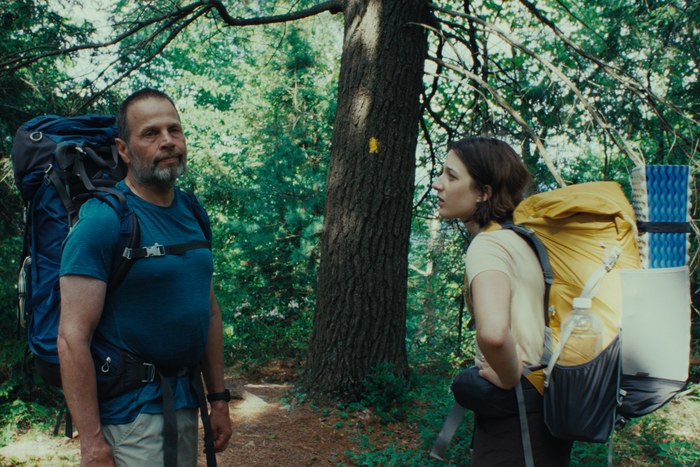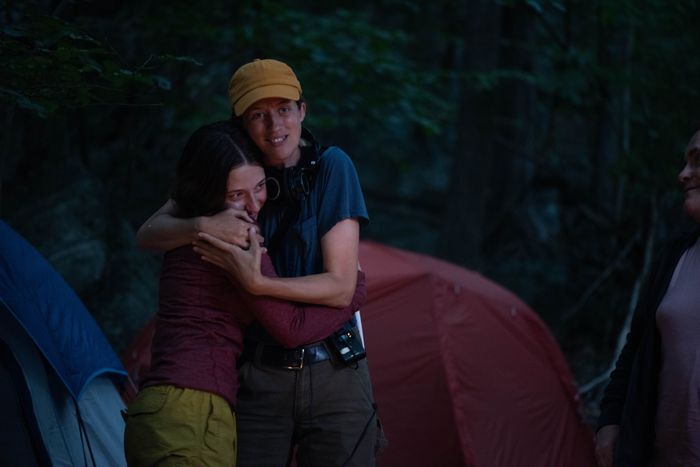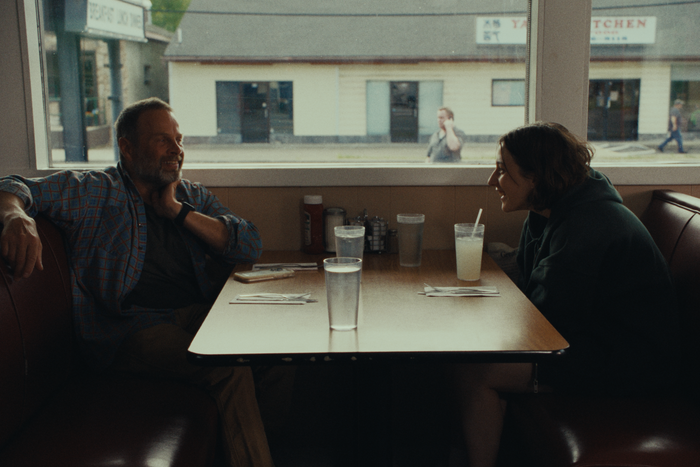
Spoilers ahead for the plot of Good One.
For most of its brisk 89 minutes, Good One is a quiet, keenly observed drama where nothing much happens — a father-daughter spin on Kelly Reichardt’s Old Joy. The film begins with a soothing score, casual humor, and evidence of a largely pleasant relationship between the father and daughter in question. Any tension surrounding the short Catskills camping trip that Chris (James Le Gros) and Sam (Lily Collias) are embarking on can be rationalized as typical of the dynamic between an astute college-bound teenager and her work-stressed parent. They hike, chitchat, play card games, and pitch tents with the ease of experienced campers. But an hour into the movie, a jarring shift occurs. Good One doesn’t feel like a thriller until a single line of dialogue turns it into one.
If something weird was bound to happen, it’s because of Matt (Danny McCarthy, recently seen on Elsbeth and Somebody Somewhere), a longtime friend of Sam’s dad. His teenage son dropped out of the trip at the last minute, converting an evenly matched weekend shared among family friends into a lopsided arrangement that relegates Sam to the literal and figurative back seat. Matt, an underemployed actor going through a bitter divorce, is a bit of a wreck; a well-cooked bowl of ramen can make him teary. He admires Sam, often addressing her like an adult and at one point deeming her “too young to be so wise” — votes of confidence that make what Matt says to Sam on their second night together all the more upsetting. Shortly after Matt recounts his marriage’s disintegration, Chris turns in. Sam then jokes that Matt could sleep by the campfire to avoid the chill of his tent, to which Matt immediately responds, “Unless you come keep me warm.” Sam’s smile fades, and a sense of dread takes over. A long pause follows, enough time for Matt to reconsider his uncomfortable proposition. But despite the melancholy in his voice, he doubles down: “Yeah, it’s not fair your dad gets an extra body.” The camera lingers on Sam’s face as she meekly says she’s going to put out the fire and head to bed. It’s a stomach-dropping scene, which is exactly what Collias experienced while shooting it.
First-time filmmaker India Donaldson, who wrote and directed Good One, designed the movie with this moment in mind. The question was where to place it. “I really wanted to allow the audience an opportunity to be with these people and get to know all three of them, and to sort of invert a traditional inciting incident,” Donaldson says. “Instead of an incident affecting everything that comes after, it’s almost like the incident recasts or complicates everything that came before it.”
Suddenly, little things Matt said leading up to the campfire conversation become a little queasy, like when he asked Sam about her “nature pee” — probably not something you want your dad’s middle-aged friend to comment on. Or when he referenced Sam’s sexuality, insinuating that being a lesbian means she can ward off male attention. Still, Donaldson wasn’t interested in framing Matt as a villain. In her mind, his overture to Sam is not premeditated. It’s far knottier, the ramblings of a lost soul desperate for connection. Donaldson maintains a lot of affection for Matt, and her goal was to avoid a “one-dimensional violation” committed by an archetypal bad man.
“Sam’s immense ability to listen — to really listen — also makes her vulnerable in this moment,” Donaldson says. “Matt feels held by her and taken care of, something that is not her responsibility. In that moment, he is confusing feelings of closeness, warmth, and intimacy with desire or attraction. It’s an instinctual moment of self-sabotage.”
Sam and Matt’s exchange occurs in the final ten pages of Donaldson’s script, even though 25 minutes remain in the film. The rest is light on dialogue, Sam processing what happened as she ambles around the wilderness on their final morning. It’s as if she’s been forced to come of age overnight, which includes deciding whether to tell Chris what happened. When she does, his response further punctures Sam’s peace of mind. “Come on, can we just have a nice day?” he asks, construing Matt’s come-on as a lack of preparation for the mountainous climate. The scene initially involved a longer conversation between Sam and Chris, which Donaldson cut down while editing the film in order to make Chris’ dismissal more pronounced.
As a whole, Good One is less about sexual predation than about a young person absorbing newfound disappointment during a moment of transition in her own life. Becoming an adult means learning to live with your parents’ complexities as they emerge in new, sometimes unflattering lights. When Sam tells Chris that, yes, they can drop the subject and “have a nice day,” she is fulfilling multiple roles, some beyond her years. Donaldson describes her as obedient daughter, therapist, mother, and object of desire all at once.
Donaldson felt it was important to see Sam strike back on her own terms; hence the rocks she deposits in Chris’s and Matt’s backpacks as silent revenge. “She has a sense of humor, and there’s almost a poetry to it,” Donaldson says. “Whether or not she’s thinking this explicitly, she is instinctively understanding in that moment, I’ve been carrying all your shit, all your emotional baggage for three days. I’ll give you some weight to carry.” The retribution is a reminder of Sam’s cleverness, a signal that she will be okay when she leaves home and begins her own adulthood. In fact, she may already be more of an adult than the adults she’s spending time with.
The rocks restore the subtle sense of humor present in Good One’s opening moments. They also allow for a grace note when the trio begin their drive back to New York City. Without speaking, Chris places one of the rocks on the car’s dashboard, which Donaldson and Collias interpret as his acknowledgment of Sam’s perspective. (Collias kept it as a souvenir.) He seems to be saying, I heard you, and we will talk about this at home. He’s accepted the punishment of his heavy backpack, and he’s countering it with a peace offering. As Collias explains, “The rock on the dashboard, for me, is him patting Sam on the back and saying, ‘Okay, that was a good one.’”



